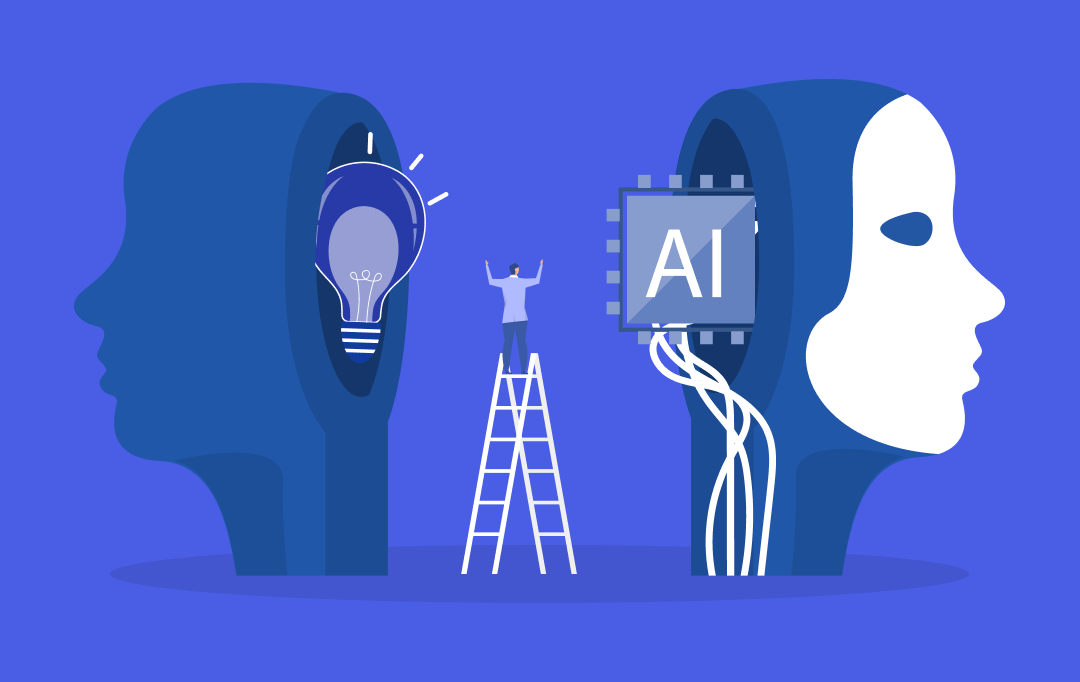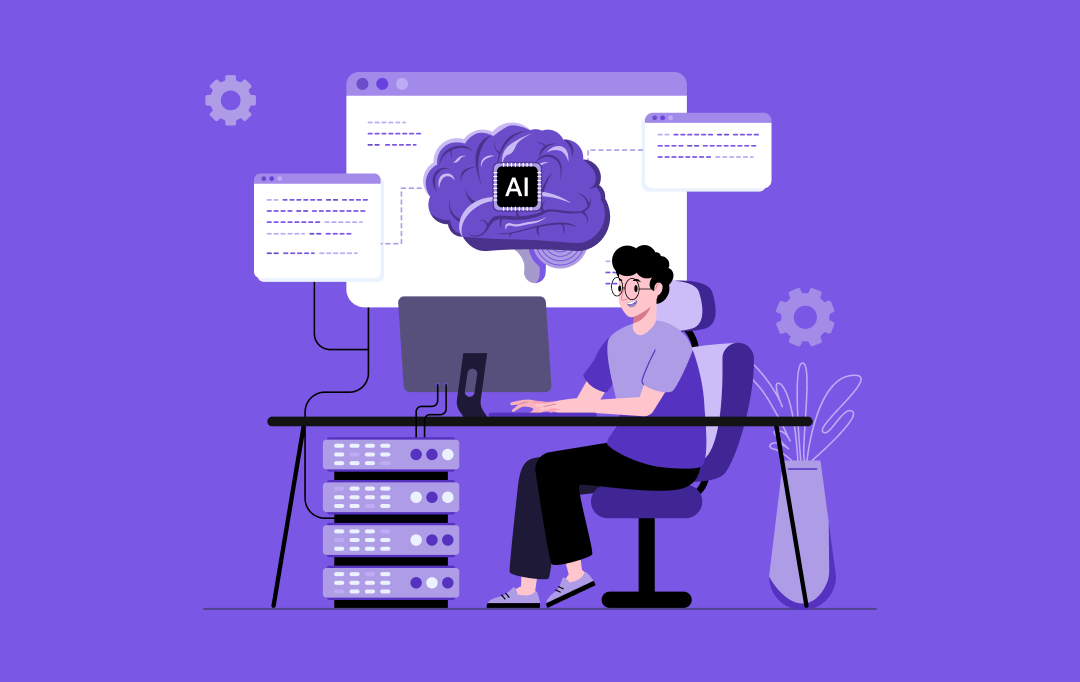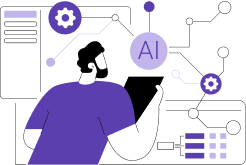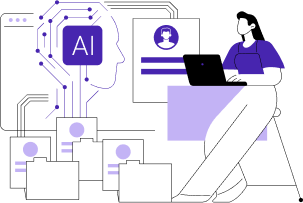- The UK's AI Ecosystem: A Strategic Advantage
- Lucrative Opportunities in AI Software Development
- 1. Accelerating Your Time-to-Market
- 2. Enhancing Product Quality and Reliability
- 3. Driving Operational and Financial Efficiency
- Navigating High-Stakes Compliance Challenges of AI in Software Development
- UK Data Privacy Laws
- Intellectual Property Concerns
- The Algorithmic Bias and Fairness
- Risks of Cyber-Attacks
- The UK's Regulatory Philosophy: A Strategic, Pro-Innovation Stance
- Your New Governance Framework: The Five Cross-Sectoral Principles
- It's All About Your Sector
- The Leadership Mandate: Best Practices for AI Risks and Compliance Management in the UK
- 1. Implement Robust Governance Structures
- 2. Ensure Transparency and Explainability
- 3. Implement a Culture of AI Literacy and Change Management
- Preparing for an AI-Integrated Future
- Regulatory Developments on the Horizon
- Evolution of Development Tools and Capabilities
- Case Study in Action: A UK E-Commerce Platform Partnered with Appinventiv
- Partner with Appinventiv for Expert Guidance on AI Development and Compliance Strategies
- FAQs
Key takeaways:
- The UK’s AI-driven economy is a powerhouse, contributing over £11.8 billion in GVA. For businesses, this means a massive, immediate opportunity for competitive advantage.
- The UK’s “pro-innovation” stance on regulation is not a rigid, one-size-fits-all rulebook. This gives you flexibility, but it demands an agile strategy built on 5 core principles.
- AI-powered software development delivers clear ROI by accelerating your time-to-market.
- Leading the AI shift requires a top-down AI risk management framework. You are ultimately responsible for navigating algorithmic bias, IP ownership, and data privacy.
AI-powered software development in the UK is rapidly transforming the way businesses operate. The technology efficiently accelerates time-to-market while also improving software quality and reducing operational costs. So, as a business leader, AI should no longer be a “what if” on your strategic roadmap; it should be a “how soon” and “how smart.” Here in the UK, this isn’t a future trend anymore. It’s the new economic reality.
The opportunity for AI software in the UK is immense. We’re not just talking about minor efficiencies. The government’s 2024 AI Sector Study recently quantified this: the UK’s AI sector has exploded, contributing £11.8 billion in Gross Value Added (GVA), a 103% jump since 2023. This isn’t just a stat; it’s a signal of a massive market shift. This is your chance to build intelligent software solutions that UK customers demand, faster and smarter than your competition.
But this is a dual-edged sword. With this great power comes a new, complex, and high-stakes compliance gauntlet. The moment your business uses AI to make decisions, analyze data, or even build its own products, you are on the Information Commissioner’s Office (ICO)’s radar.
Our analysis shows that winning with AI-powered software development isn’t about building a tool. It’s about executing a strategy that is as robust on compliance as it is ambitious on innovation.
To help you navigate the compliance risks successfully, we have crafted this blog. This will help you cut through the technical noise and focus on the strategic opportunities of AI in software development and the critical risks.
The UK’s AI sector grew by 103% in just one year. Don’t miss your chance to capitalize on this AI trend.
The UK’s AI Ecosystem: A Strategic Advantage
The UK has long been a leader in innovation, and AI is no exception. The country’s commitment to AI technology is evident through various government-backed initiatives and private-sector investment. For your business, this means you aren’t just using AI; you’re operating within one of the most supercharged AI ecosystems on the planet.
With over 5,800 AI companies and an 86,000-strong workforce, the talent pool and partnership opportunities are rich. The government is also actively fueling this growth. The 2025 AI Opportunities Action Plan and the creation of “AI Growth Zones” are clear signals of a pro-business environment. By establishing the world-first AI Safety Institute, the UK has also signaled its game plan: to lead innovation by also leading on safety and governance.
For you as a forward-thinking entrepreneur, this ecosystem is a massive asset. It provides the talent, the AI-powered software development platforms, and the government support to pursue AI innovation in the UK tech sector with confidence.
As AI initiatives mature, many organisations begin reassessing their approach to hiring an AI development partner in the UK to translate ecosystem strength into real enterprise outcomes.
Lucrative Opportunities in AI Software Development
As AI continues to disrupt traditional business models, it offers numerous opportunities to improve software development processes. Working with a specialized AI development company in the UK can help businesses unlock these opportunities while navigating the complex regulatory landscape. However, AI doesn’t just improve the development process; it also drives impressive business outcomes such as faster product delivery, cost savings, and improved customer experiences. In short, benefits of AI in software development in the UK are not just technical; they are fundamental business drivers. Here are some of the most remarkable advantages of AI-powered software development:
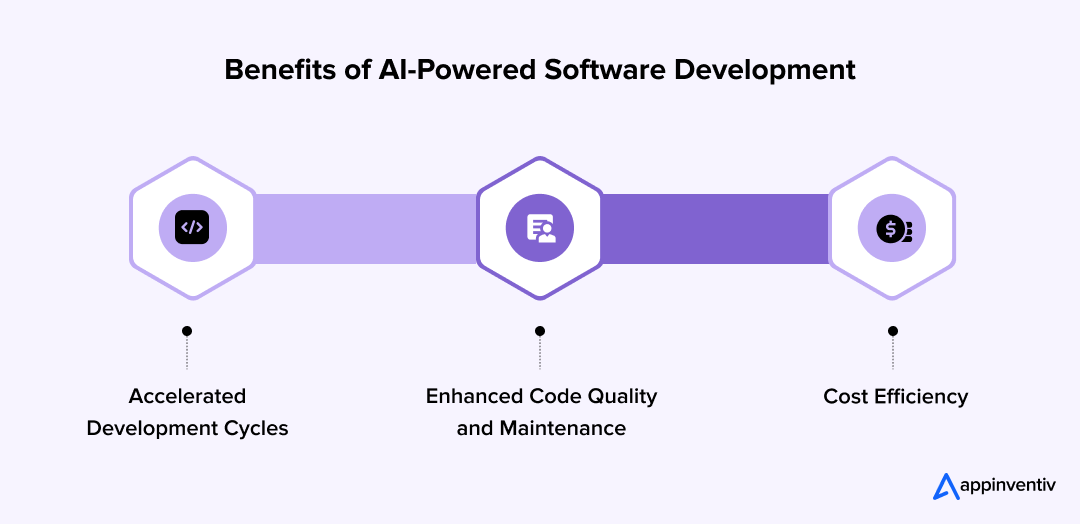
1. Accelerating Your Time-to-Market
The most immediate impact is speed. But “speed” in business doesn’t just mean “faster coding.” It means launching your next product, feature, or service before your competitors.
Using generative AI for coding and other AI-powered software development tools automates the low-value, repetitive work. This frees your most expensive, high-value talent, your senior engineers and architects, to focus on complex problem-solving and innovation.
The result is a compressed product lifecycle. You get from an idea in a strategy meeting to a product in your customer’s hands at a pace that was previously impossible.
2. Enhancing Product Quality and Reliability
Speed is useless if the product is faulty. This is where AI provides a crucial, business-protecting function. AI models can analyze new software for bugs, security vulnerabilities, and logic flaws as it’s being built.
For your business, this means:
- Fewer customer-facing bugs.
- Less risk of costly, brand-damaging downtime.
- A more secure product, which protects you from data breaches.
Beyond launch, AI excels at predictive maintenance, flagging potential system failures before they happen. This shifts your operational posture from reactive (fixing what’s broken) to proactive (preventing breakage).
3. Driving Operational and Financial Efficiency
When you build faster and with higher quality, the obvious result is a healthier bottom line. This is where AI delivers clear financial value.
- It allows you to optimize your most expensive resources: employees and infrastructure.
- Repetitive, manual tasks in areas like quality assurance or data analysis can be heavily automated, lowering overhead.
- Cloud spend can be dynamically managed by AI models that predict demand, ending the all-too-common problem of paying for server capacity you don’t use.
Navigating High-Stakes Compliance Challenges of AI in Software Development
The opportunities of AI in software development are transformative. But they are inseparable from a new class of software development compliance risks. As a business leader, these risks ultimately fall on your desk. Ignoring this part of the AI software UK equation is not an option.
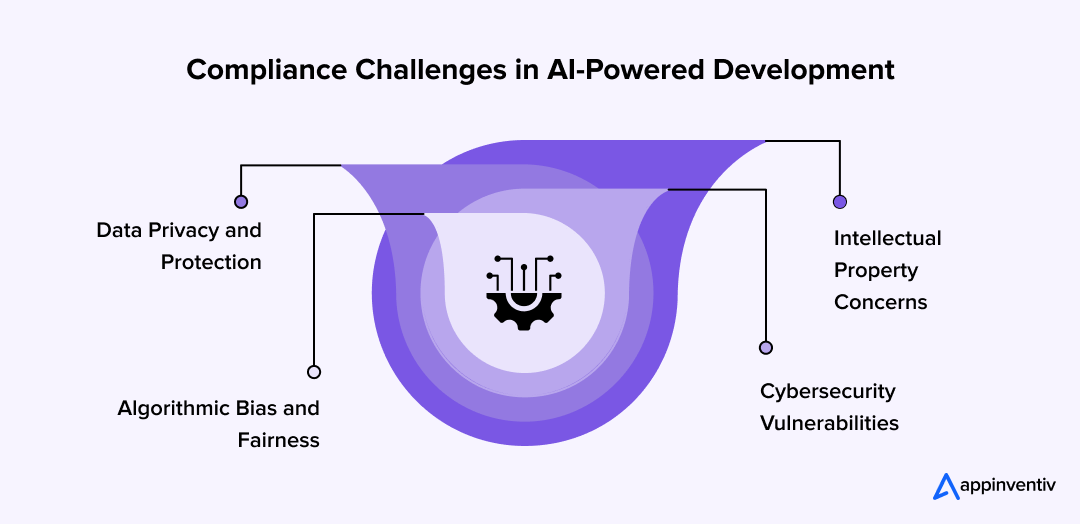
UK Data Privacy Laws
This is the number one risk. The moment your AI system is trained on or processes personal data, AI data protection law, GDPR in the UK applies. You must have a lawful basis, minimize the data you use, and be able to respect customer data rights.
The ICO is not taking this lightly. The regulator is actively updating its guidance on AI. The penalties for failure are not just a slap on the wrist; they can be as high as £17.5 million or 4% of your global annual turnover. This is a business-critical financial and reputational risk.
Intellectual Property Concerns
A legal and strategic black hole has opened up: who owns AI-generated code?
Imagine this: the AI software developers you hire in the UK build your flagship product using an AI assistant. Who owns the IP for that code? Is it your company? The development firm? Or is it a “derivative work” based on copyrighted data the model was trained on?
This ambiguity creates enormous software development compliance risks. Without a crystal-clear corporate policy and robust vendor contracts, you risk building your company’s core value on an IP foundation of quicksand.
The Algorithmic Bias and Fairness
Your AI is not an objective oracle. It’s a mirror reflecting the data it was trained on. If that data contains historical, human biases (e.g., in hiring, lending, or marketing), your AI will learn, replicate, and amplify those biases at machine scale.
This is a massive legal and ethical landmine. It exposes your company to discrimination lawsuits and can cause irreversible brand damage. The UK’s framework puts “fairness” front and center, meaning the burden of proof is on you to demonstrate how you are actively testing for and mitigating bias.
Risks of Cyber-Attacks
The same AI that helps you grow can be the reason for your downfall, too. AI systems, if not properly secured, can be vulnerable to cyberattacks, particularly as malicious actors use AI themselves to develop more sophisticated exploits.
Thus, your AI risk management plan must now account for new cybersecurity threats like “prompt injection” or “data poisoning.” It’s no longer just about securing your network; you must secure the AI models themselves.
The UK’s Regulatory Philosophy: A Strategic, Pro-Innovation Stance
To navigate these risks, you must understand the UK’s unique regulatory philosophy. This is a key part of your AI business strategy. The UK has not followed the EU’s path of a single, prescriptive AI Act. Instead, it has opted for a “pro-innovation” approach.
This is a crucial distinction. It’s more flexible, but it puts more responsibility on you to interpret the rules. The AI regulation in the UK is a set of five cross-sectoral principles that existing regulators (like the ICO and the FCA) will enforce within their specific domains.
Your New Governance Framework: The Five Cross-Sectoral Principles
Your entire principles of responsible AI and software compliance UK strategy should be built to answer questions about these five pillars:
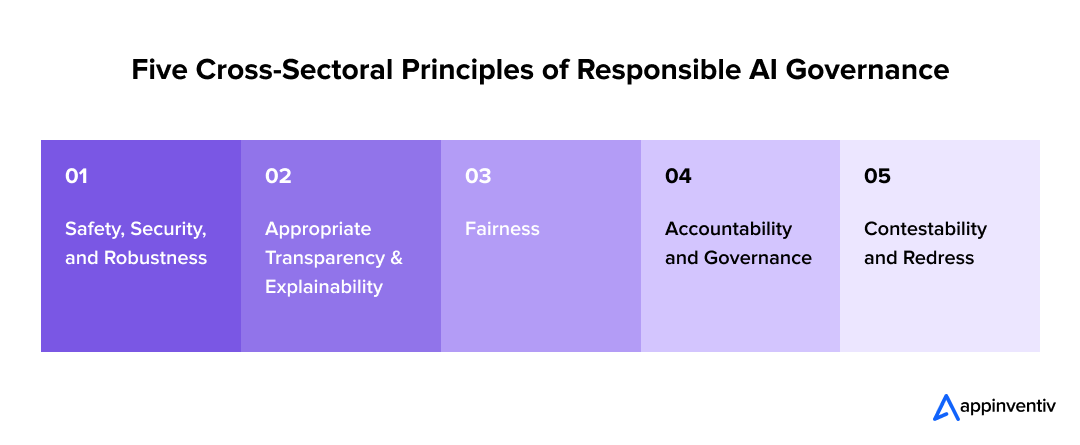
- Safety, Security, and Robustness: Does the AI do what you say it does, and is it secure?
- Appropriate Transparency and Explainability: Can you explain how your AI made a critical decision? “It’s a black box” is not a legal defense.
- Fairness: How are you ensuring the system does not produce discriminatory outcomes?
- Accountability and Governance: Who in your company is accountable? There must be clear lines of human oversight.
- Contestability and Redress: If your AI denies someone a service, what is their path to appeal to a human?
Answering what are the compliance guidelines for AI in the UK means having a solid, documented answer for each of these five points.
It’s All About Your Sector
Implementing these five principles is the most critical part of the UK AI regulations for developers and business leaders. How you apply these principles depends entirely on your industry.
- In Finance? The FCA will apply these principles through the lens of Consumer Duty.
- In Healthcare? The MHRA will focus on clinical safety and robustness.
- In manufacturing? Businesses must comply with health and safety regulations
- In any sector? The ICO will be your primary regulator for any AI that touches personal data, using UK data privacy laws (GDPR) as its enforcement tool.
Your compliance strategy, therefore, cannot be generic. It must be bespoke.
The Leadership Mandate: Best Practices for AI Risks and Compliance Management in the UK
Knowing the principles is one thing. Implementing them successfully is what matters the most. A practical AI risk management UK framework is how you move from theory to defensible corporate policy.
1. Implement Robust Governance Structures
To effectively navigate the complexities of AI, you need a well-defined governance framework. This is not just about following the rules. It’s about building a structure that ensures responsible, transparent, and ethical AI deployment.
- Set up an AI Ethics Committee: This is your strategic governance body. It must include leaders from legal, tech, and the business lines to review and green-light AI projects before bringing them into the market.
- Mandate an AI Risk Register: This is your central log of every AI model in use, which tracks its purpose, the data it uses, its known risks (bias, IP), and the mitigation steps in place.
- Enforce Data Protection Impact Assessments (DPIAs): This isn’t optional. For any AI project using personal data that might be high-risk, a DPIA is a legal requirement under AI data protection law in the UK.
2. Ensure Transparency and Explainability
The “black box” is a massive liability. As a business leader, you must ensure that your systems are explainable. This doesn’t mean you need to understand the advanced math. It does mean your team must be able to:
- Audit why a specific decision was made.
- Provide a simple, human-readable justification for an automated outcome.
- Monitor models for “drift” to ensure their logic doesn’t change in unexpected, non-compliant ways.
3. Implement a Culture of AI Literacy and Change Management
Your biggest compliance risk isn’t the technology; it’s a workforce that isn’t prepared for it. Your role is to champion this change. AI-related compliance issues evolve quickly. Thus, it is integral for your teams to stay updated on the latest regulations, industry best practices, and ethical standards.
Your legal team needs to understand the IP risks of generative AI for coding. Your marketing team needs to understand the fairness rules for personalization algorithms.
Preparing for an AI-Integrated Future
This technology is not standing still. AI software development trends in the UK are advancing exponentially. These advancements have paved the way for exciting possibilities in software development in the UK. Thus, businesses wishing to enjoy the perks of these advancements must remain agile and prepared to adapt to new regulations and challenges.
Regulatory Developments on the Horizon
The regulatory trajectory seems increasingly clear. The “pro-innovation” phase won’t last forever. We fully expect regulators like the ICO to issue more detailed guidance and begin more public, aggressive enforcement. Thus, your compliance framework must be a living, breathing part of your business, not a one-time project.
More immediately, the EU Data Act, which came into law in June 2025, impacts how organizations approach data-intensive AI development. The ICO has committed to updating its guidance to account for generative AI implications under this new framework. You should monitor these updates closely as they provide regulatory bodies’ evolving interpretation of compliance requirements.
Evolution of Development Tools and Capabilities
AI-powered software development platforms continue advancing. Multi-model approaches like GitHub’s support for Claude, Gemini, and GPT-4 will increase developer choice and tool specialization.
Agentic workflows enabling AI systems to independently handle routine development tasks will become more sophisticated. Security tooling integrating AI-assisted code generation with automated vulnerability scanning will mature. The trajectory points toward AI getting embedded in development workflows at every level: design, development, testing, deployment, and monitoring.
This creates both opportunity and responsibility. Organizations that master this evolution gain a competitive advantage. Those that stumble face technical debt, security vulnerabilities, and regulatory friction.
In essence, the future of AI powered software development in the UK presents a wealth of opportunities, but it also requires proactive planning and compliance. Businesses that can navigate these complexities confidently will stay ahead of regulatory developments as well as unlock new avenues for growth and success.
AI is the future and the future is now. Learn how Appinventiv can help your business stay ahead with next gen AI software that is secure and compliant.
Case Study in Action: A UK E-Commerce Platform Partnered with Appinventiv
The Challenge: A London-based e-commerce platform was losing market share. Their development was slow, and their leadership was deeply concerned about violating AI data protection law in the UK, which stalled their innovation.
The Solution: The company partnered with us. We implemented a “compliance-by-design” AI-powered software development strategy. Our team didn’t just build the software; we first established a robust AI risk management framework.
We co-created their AI governance policies, conducted the necessary DPIAs (Data Protection Impact Assessments), and then deployed AI tools to automate their QA, personalize user experience, and accelerate their coding pipeline.
Achieved Outcome:
- 70% acceleration in their development-to-deployment lifecycle
- 0 compliance breaches or data incidents in the 12 months post-launch.
- 15% increase in customer retention, attributed directly to the new AI-powered personalization engine.
- 40% reduction in manual QA and testing costs.
Partner with Appinventiv for Expert Guidance on AI Development and Compliance Strategies
So far, the challenge in AI-powered software development in the UK is clear. How do you seize this undeniable competitive advantage without steering your company into a legal or ethical minefield?
Well, this isn’t a journey to take on guesswork. Success demands a trusted tech partner who is as fluent in business strategy and regulatory risk as they are in AI technology. This is where we come in.
At Appinventiv, we are not just a technology partner you hire to get AI development services. We are your trusted torach bearer who stands by you at every step of AI software development, helping you navigate the complex compliance maze, build a secure AI platform and update your legacy infrastructure with AI. We even provide post-launch support so that your AI project can stay aligned with the changing regulatory rules.
In our 10+ years of industry experience, we have built one of the largest AI delivery ecosystems in the UK and global market, focused on driving measurable business impact. Here is a stark reality of our AI expertise:
- 300+ AI-Powered Solutions Delivered
- 150+ Custom AI Models Trained & Deployed
- 75+ Enterprise AI Integrations Completed
- 50+ Bespoke LLMs Fine-tuned
- 5+ Strategic AI Partnerships
- 98% AI Prediction Accuracy
- 10x Faster Time-to-Market
- 40% Average Reduction in Costs
We help enterprises rethink what’s possible with compliant, scalable, and intelligent software solutions. Our team of 1600+ tech experts, including 200+ data scientists & AI engineers, ensures that innovation never comes at the cost of governance, transparency, or security.
Our entire approach to AI-powered software development in the UK is built on “compliance-by-design.” We don’t bolt on compliance at the end; we integrate AI risk management principles into the very first strategy session.
In straight terms, we help you:
- Strategize: Identify the high-value, low-risk AI opportunities that will drive your business forward.
- Govern: Build the practical governance frameworks and DPIAs you need to operate confidently within UK AI regulations.
- Build: Use the latest AI-powered software development platforms to create secure, fair, and transparent AI software in the UK.
- Evolve: Ensure your AI systems are monitored and maintained to stay compliant and effective long-term.
Don’t let the complexity of compliance stall the biggest innovation of our time. Contact Appinventiv today to build your future with confidence, compliance, and clarity.
FAQs
Q. What are the benefits of AI in software development?
A. AI-powered software development delivers measurable benefits for business. Here are the most important ones:
- Reduced development time.
- Enhanced code quality
- Improved maintainability through consistent patterns
- Significant cost efficiency from resource optimization
- Faster time-to-market
- Improved competitive positioning.
Q. How is AI transforming the software development process in the UK?
A. AI software development in the UK transforms businesses by doing multiple value-driven tasks faster and with higher accuracy. This includes but is not limited to:
- It’s being used to unlock data-driven insights for better decision-making
- It helps automate complex internal processes and save valuable time.
- It creates highly personalized intelligent software solutions in the UK that drastically improve the customer experience.
Q. What are the compliance risks of using AI in software development?
A. The top software development compliance risks for businesses are:
- Financial: Heavy fines for violating law of AI data protection (GDPR).
- Reputational: Irreversible brand damage from deploying a biased or discriminatory algorithm.
- Legal: Costly lawsuits over IP ownership of AI-generated code.
- Operational: Loss of customer trust if your AI is a “black box” and you can’t explain its decisions.
Q. How does UK GDPR affect AI-based software development?
A. AI data protection law of UK GDPR is central in software development. If your AI system processes any personal data (even for training), you must have a lawful basis, conduct a Data Protection Impact Assessment (DPIA) for high-risk processing, and respect all user rights, especially those related to automated decision-making.
Q. How can businesses ensure AI compliance in the UK?
A. Ensuring AI compliance in the UK is a critical function. You must establish a top-down governance framework. This includes:
- Creating an internal AI ethics committee.
- Building your strategy around the UK’s five core principles.
- Mandating regular risk assessments and DPIAs.
- Insisting on Explainable AI (XAI) practices; no “black boxes.”
- Keeping meticulous records to prove your due diligence to regulators.
Q. Are there legal risks with AI-generated code in the UK?
A. Yes. This is primarily around intellectual property and licensing. AI-generated code might resemble existing open-source projects with restrictive licenses. This can create potential copyright conflicts.
Additionally, code ownership questions remain unsettled when external AI providers assist development. Mitigate through licensing compliance reviews before deployment, governance policies around external tool use, and when appropriate, using enterprise AI tool tiers that exclude proprietary code from model training.
Q. What type of compliance issues could be caused by AI systems?
A. AI systems can create several new and significant compliance risks that fall into a few key categories:
- Data Privacy & GDPR Violations
- Algorithmic Bias and Discrimination
- Intellectual Property (IP) Disputes
- Lack of Explainability (The “Black Box” Problem)
Q. What is the key challenge in implementing AI in regulatory compliance?
A. The single biggest challenge is the “black box” problem, which is technically known as a lack of Explainability (XAI).
From a CEO’s perspective, this isn’t just a technical issue; it’s a fundamental business and legal roadblock. Here’s why:
Regulators, auditors, and your own customers demand to know why a decision was made. If you are using an AI to detect fraud (a compliance task), you must be able to explain how it identified a specific transaction as fraudulent.
With many of the most powerful AI models, their decision-making processes are so complex that they are effectively opaque, even to the data scientists who built them.
This one “black box” challenge creates a cascade of other problems:
- Accountability
- Proving Fairness
- Auditability


- In just 2 mins you will get a response
- Your idea is 100% protected by our Non Disclosure Agreement.

How Australian Enterprises Are Using Intelligent Automation to Reduce Operational Cost
Key takeaways: Australian enterprises are using intelligent automation to automate core processes such as reconciliations, approvals, exception handling, and compliance reporting. Intelligent automation initiatives typically range from AUD 70,000 to AUD 700,000, depending on scope, integration depth, and governance needs. When implemented with control, intelligent automation delivers lower operating cost, faster decision cycles, and improved…

From Chatbots to AI Agents: Why Kuwaiti Enterprises are Investing in AI-Powered App Development
Key Takeaways Kuwaiti organizations are moving beyond basic chatbots to deploy AI agents that handle tasks, analyze data, and support operations intelligently. National initiatives such as Vision 2035 and CITRA regulations are creating a structured environment for AI-powered app development in Kuwait. Businesses in key sectors like banking, oil and gas, retail, and public services…
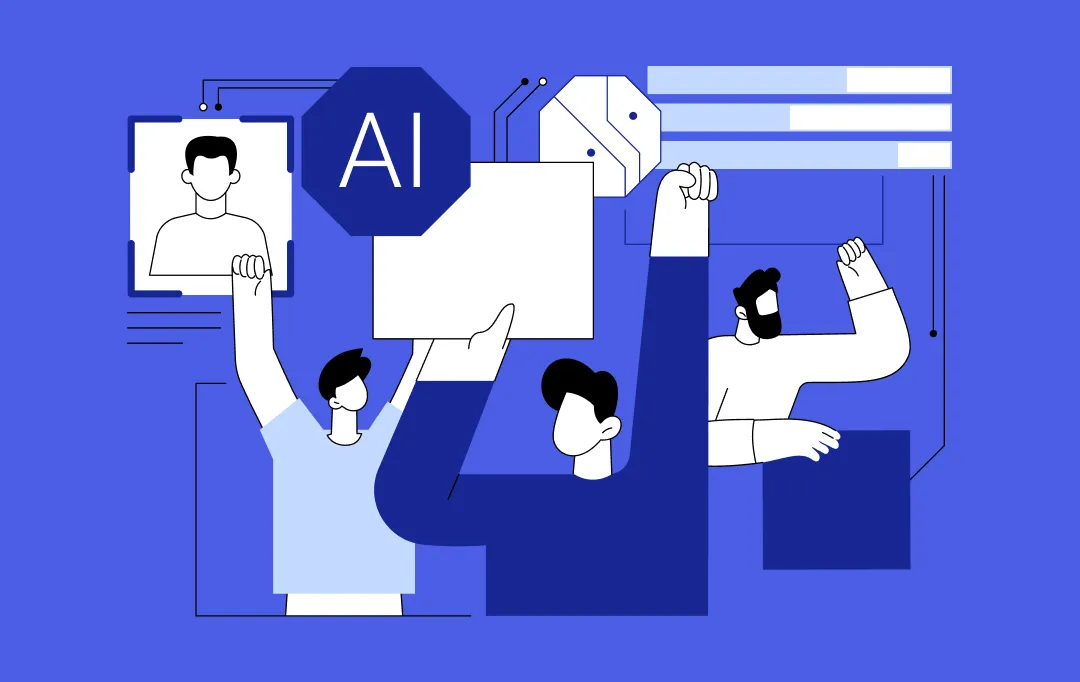
Beyond the Hype: Practical Generative AI Use Cases for Australian Enterprises
Key takeaways: Enterprises in Australia are adopting Gen AI to address real productivity gaps, particularly in reporting, analysis, and service delivery. From banking and pharmaceutical to mining and agriculture, Gen AI is applied across industries to modernise legacy systems and automate knowledge-intensive and documentation-heavy workflows. The strongest outcomes appear where Gen AI is embedded into…

























